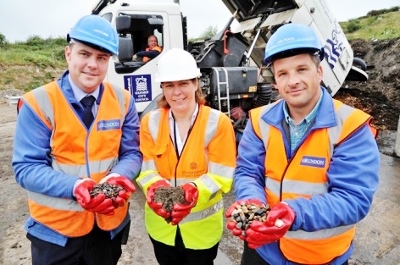County’s road sweepings to boost recycling rates
On 03/08/2015 At 4:16 pm
Category : Missed a ThameNews story?, More News, Thame news
Responses : No Comments
ROAD sweepings from across Oxfordshire are to be processed at a state-of-the-art new treatment and recovery facility in Ewelme in South Oxfordshire, a move designed to boost recycling rates and help cut costs for the county council.
The specially-designed facility, built by Grundon Waste Management at a cost of £1.3 million, is one of the most technically advanced in the UK and will be able to process and recycle the 5,000 tonnes per year of road sweeping waste including leaves, sand and grit, and metals collected from Oxfordshire’s roads by operators working for each of the five district councils.
BACKGROUND
Three years ago, the Environment Agency banned the composting of street leaf sweepings because of concerns about the high levels of contaminants such as nickel, copper and zinc. This move left many local authorities worried about the impact on their recycling rates and having to find alternative disposal methods for the waste.
Keen to maintain its place as one of the top performing county councils in the recycling performance league tables, Oxfordshire County Council had to put in place interim measures, while looking for a more sustainable and local alternative.
Rebecca Harwood, service delivery manager at Oxfordshire County Council’s waste management group, said: “After the legislation changed, we had to send some road sweeper waste to landfill, while the remainder went to an alternative facility outside the county.
“Obviously we were very keen to look for alternatives which would be closer to home and more environmentally friendly. Grundon’s new facility is not only very impressive, but it offers the capability to handle all of the county’s road sweeper waste in one central place.
“We see it as a win-win situation, using the facility is half the cost of sending waste to landfill and we’re also cutting down on transport costs and carbon emissions. Above all though, it’s the fact that Grundon is able to recycle and recover all elements of the sweepings that makes the biggest difference. We anticipate this will help us boost our recycling performance rates by nearly 2%, which is a great result.”
While Oxfordshire County Council makes the decisions on where waste will be disposed, each of the five district councils is responsible for managing the actual collection. Operators acting for the Vale of White Horse and South Oxfordshire District Councils, together with Oxford City Council, will deliver the waste directly to Ewelme at the end of each clean-up round.
Further afield, road sweepings from West Oxfordshire and Cherwell District Councils will be ‘bulked up’ at waste transfer stations at Banbury and Cassington before being transferred to Ewelme in larger vehicles.
 Owen George, tender manager at Grundon, said: “Our decision to invest in the new facility was born out of finding a sustainable and suitable solution to the problems local authorities had in recycling their road sweeper waste. Oxfordshire County Council has been very supportive throughout the development stages of the project and we’re delighted to be able to play our own part in helping the county fly the flag for excellence in recycling and recovery of waste.”
Owen George, tender manager at Grundon, said: “Our decision to invest in the new facility was born out of finding a sustainable and suitable solution to the problems local authorities had in recycling their road sweeper waste. Oxfordshire County Council has been very supportive throughout the development stages of the project and we’re delighted to be able to play our own part in helping the county fly the flag for excellence in recycling and recovery of waste.”
Three new jobs have also been created at the plant which, once fully operational, will be able to process around 25,000 tonnes of road sweepings a year – roughly 10 tonnes every hour. As capacity increases, Grundon plans to work with other local authorities and private contractors across the region.
HOW IT WORKS
On arrival, the road sweeping material goes into a giant tipping area where excess water is drained and stored for treatment and re-use later in the process. A giant magnet then removes any metallic objects, such as nails or bottle tops, before the material is thoroughly scrubbed and washed.
 Screening removes larger aggregate materials (gravels of 5mm-40+mm) and these are sorted and stored by size, while the remainder goes into a Hydro cyclone – effectively a giant washing machine – which separates out organic material such as leaves and litter, from sand and grit. Each is then stored in different bunkers.
Screening removes larger aggregate materials (gravels of 5mm-40+mm) and these are sorted and stored by size, while the remainder goes into a Hydro cyclone – effectively a giant washing machine – which separates out organic material such as leaves and litter, from sand and grit. Each is then stored in different bunkers.
All the waste water is treated with a polymer which separates out the clean water from the sludge and, after further processing, the sludge forms a ‘filter cake’ which can be used in land restoration projects.
Thanks to the sophisticated recovery process, both the sand and the larger size aggregates qualify for ‘end of waste’ status, allowing them to be sold to the building trade, and sand and gravel businesses, where demand for recycled products is high as they are cheaper than virgin aggregates.


